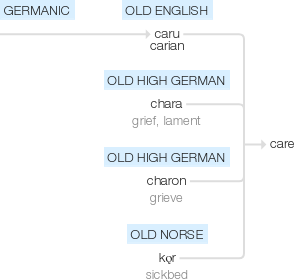Care
Old English caru (noun), carian (verb), of Germanic origin; related to Old High German chara ‘grief, lament’, charon ‘grieve’, and Old Norse kǫr ‘sickbed’.
wiktionary
From Middle English care, from Old English caru, ċearu(“care, concern, anxiety, sorrow, grief, trouble”), from Proto-Germanic *karō(“care, sorrow, cry”), from Proto-Indo-European *ǵeh₂r-(“shout, call”). Cognate with Old Saxon cara, kara(“concern, action”), Middle High German kar(“sorrow, lamentation”), Icelandic kör(“sickbed”), Gothic 𐌺𐌰𐍂𐌰( kara, “concern, care”). Related also to Dutch karig(“scanty”), German karg(“sparse, meagre, barren”), Latin garriō, Ancient Greek γῆρυς(gêrus). See also chary.
From Middle English caren, carien, from Old English carian(“to sorrow, grieve, be troubled, be anxious, to care for, heed”), from Proto-West Germanic *karōn(“to care”), from Proto-Germanic *karōną(“to care”).
Cognate with Middle High German karn(“to complain, lament, grieve, mourn”), Alemannic German karen, kären(“to groan, wheeze, give a death rattle”), Swedish kära(“to fall in love”), Icelandic kæra(“to care, like”), Gothic 𐌺𐌰𐍂𐍉𐌽( karōn, “to be concerned”).
etymonline
care (n.)
Old English caru, cearu "sorrow, anxiety, grief," also "burdens of mind; serious mental attention," in late Old English also "concern, anxiety caused by apprehension of evil or the weight of many burdens," from Proto-Germanic *karō "lament; grief, care" (source also of Old Saxon kara "sorrow;" Old High German chara "wail, lament;" Gothic kara "sorrow, trouble, care;" German Karfreitag "Good Friday;" see care (v.)).
Meaning "charge, oversight, attention or heed with a view to safety or protection" is attested from c. 1400; this is the sense in care of in addressing (1840). Meaning "object or matter of concern" is from 1580s. To take care of "take in hand, do" is from 1580s; take care "be careful" also is from 1580s.
The primary sense is that of inward grief, and the word is not connected, either in sense or form, with L. cura, care, of which the primary sense is pains or trouble bestowed upon something. [Century Dictionary]
care (v.)
Old English carian, cearian "be anxious or solicitous; grieve; feel concern or interest," from Proto-Germanic *karo- "lament," hence "grief, care" (source also of Old Saxon karon "to lament, to care, to sorrow, complain," Old High German charon "complain, lament," Gothic karon "be anxious"), said to be from PIE root *gar- "cry out, call, scream" (source also of Irish gairm "shout, cry, call;" see garrulous).
If so, the prehistoric sense development is from "cry" to "lamentation" to "grief." A different sense evolution is represented in related Dutch karig "scanty, frugal," German karg "stingy, scanty." It is not considered to be related to Latin cura. Positive senses, such as "have an inclination" (1550s); "have fondness for" (1520s) seem to have developed later as mirrors to the earlier negative ones.
To not care as a negative dismissal is attested from mid-13c. Phrase couldn't care less is from 1946; could care less in the same sense (with an understood negative) is from 1955. Care also has figured since 1580s in many "similies of indifference" in the form don't care a _____, with the blank filled by fig, pin, button, cent, straw, rush, point, farthing, snap, etc., etc. Related: Cared; caring.
